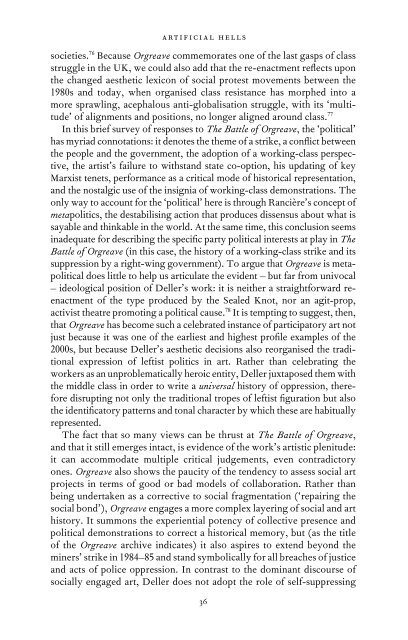Participatory Art and the Politics of Spectatorship - autonomous ...
Participatory Art and the Politics of Spectatorship - autonomous ...
Participatory Art and the Politics of Spectatorship - autonomous ...
You also want an ePaper? Increase the reach of your titles
YUMPU automatically turns print PDFs into web optimized ePapers that Google loves.
artificial hells<br />
societies. 76 Because Orgreave commemorates one <strong>of</strong> <strong>the</strong> last gasps <strong>of</strong> class<br />
struggle in <strong>the</strong> UK, we could also add that <strong>the</strong> re- enactment refl ects upon<br />
<strong>the</strong> changed aes<strong>the</strong>tic lexicon <strong>of</strong> social protest movements between <strong>the</strong><br />
1980s <strong>and</strong> today, when organised class resistance has morphed into a<br />
more sprawling, acephalous anti- globalisation struggle, with its ‘multitude’<br />
<strong>of</strong> alignments <strong>and</strong> positions, no longer aligned around class. 77<br />
In this brief survey <strong>of</strong> responses to The Battle <strong>of</strong> Orgreave, <strong>the</strong> ‘political’<br />
has myriad connotations: it denotes <strong>the</strong> <strong>the</strong>me <strong>of</strong> a strike, a confl ict between<br />
<strong>the</strong> people <strong>and</strong> <strong>the</strong> government, <strong>the</strong> adoption <strong>of</strong> a working- class perspective,<br />
<strong>the</strong> artist’s failure to withst<strong>and</strong> state co- option, his updating <strong>of</strong> key<br />
Marxist tenets, performance as a critical mode <strong>of</strong> historical representation,<br />
<strong>and</strong> <strong>the</strong> nostalgic use <strong>of</strong> <strong>the</strong> insignia <strong>of</strong> working- class demonstrations. The<br />
only way to account for <strong>the</strong> ‘political’ here is through Rancière’s concept <strong>of</strong><br />
metapolitics, <strong>the</strong> destabilising action that produces dissensus about what is<br />
sayable <strong>and</strong> thinkable in <strong>the</strong> world. At <strong>the</strong> same time, this conclusion seems<br />
inadequate for describing <strong>the</strong> specifi c party political interests at play in The<br />
Battle <strong>of</strong> Orgreave (in this case, <strong>the</strong> history <strong>of</strong> a working- class strike <strong>and</strong> its<br />
suppression by a right- wing government). To argue that Orgreave is metapolitical<br />
does little to help us articulate <strong>the</strong> evident – but far from univocal<br />
– ideological position <strong>of</strong> Deller’s work: it is nei<strong>the</strong>r a straightforward re-<br />
enactment <strong>of</strong> <strong>the</strong> type produced by <strong>the</strong> Sealed Knot, nor an agit- prop,<br />
activist <strong>the</strong>atre promoting a political cause. 78 It is tempting to suggest, <strong>the</strong>n,<br />
that Orgreave has become such a celebrated instance <strong>of</strong> participatory art not<br />
just because it was one <strong>of</strong> <strong>the</strong> earliest <strong>and</strong> highest pr<strong>of</strong>i le examples <strong>of</strong> <strong>the</strong><br />
2000s, but because Deller’s aes<strong>the</strong>tic decisions also reorganised <strong>the</strong> traditional<br />
expression <strong>of</strong> leftist politics in art. Ra<strong>the</strong>r than celebrating <strong>the</strong><br />
workers as an unproblematically heroic entity, Deller juxtaposed <strong>the</strong>m with<br />
<strong>the</strong> middle class in order to write a universal history <strong>of</strong> oppression, <strong>the</strong>refore<br />
disrupting not only <strong>the</strong> traditional tropes <strong>of</strong> leftist fi guration but also<br />
<strong>the</strong> identifi catory patterns <strong>and</strong> tonal character by which <strong>the</strong>se are habitually<br />
represented.<br />
The fact that so many views can be thrust at The Battle <strong>of</strong> Orgreave,<br />
<strong>and</strong> that it still emerges intact, is evidence <strong>of</strong> <strong>the</strong> work’s artistic plenitude:<br />
it can accommodate multiple critical judgements, even contradictory<br />
ones. Orgreave also shows <strong>the</strong> paucity <strong>of</strong> <strong>the</strong> tendency to assess social art<br />
projects in terms <strong>of</strong> good or bad models <strong>of</strong> collaboration. Ra<strong>the</strong>r than<br />
being undertaken as a corrective to social fragmentation (‘repairing <strong>the</strong><br />
social bond’), Orgreave engages a more complex layering <strong>of</strong> social <strong>and</strong> art<br />
history. It summons <strong>the</strong> experiential potency <strong>of</strong> collective presence <strong>and</strong><br />
political demonstrations to correct a historical memory, but (as <strong>the</strong> title<br />
<strong>of</strong> <strong>the</strong> Orgreave archive indicates) it also aspires to extend beyond <strong>the</strong><br />
miners’ strike in 1984– 85 <strong>and</strong> st<strong>and</strong> symbolically for all breaches <strong>of</strong> justice<br />
<strong>and</strong> acts <strong>of</strong> police oppression. In contrast to <strong>the</strong> dominant discourse <strong>of</strong><br />
socially engaged art, Deller does not adopt <strong>the</strong> role <strong>of</strong> self- suppressing<br />
36
















